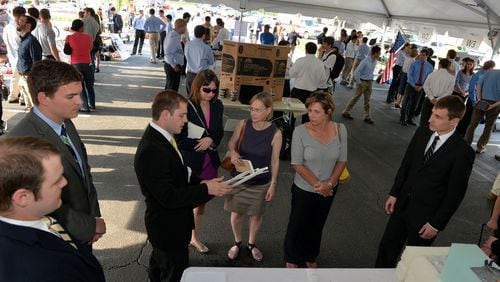The high-tech workers are already here. Companies just don’t want to hire older employees, and they don’t want to pay an adequate wage for the jobs.
That’s the message gleaned from interviews with about a dozen workers who disputed a recent state report that found there are not enough skilled employees to fill high-demand computer and engineering jobs.
“I have become acquainted with dozens of incredibly capable people, willing and able to outperform anyone out there, but prevented from doing so merely by their excess of experience,” said Norcross resident Paul Allen, 63, who was laid off from his engineering position two years ago.
The High Demand Career Initiative report, which detailed accounts from more than 80 employers and industry experts, cited a number of executives who said they would be forced to search outside Georgia to fill positions held by soon-to-be retiring staffers. The workers here who are available lack the "soft skills" valued by employers, such as problem-solving and communication, the report found.
The demand for those workers will likely grow as more sought-after employers move to Georgia. Mercedes-Benz announced Tuesday that it will move its U.S. headquarters from New Jersey to metro Atlanta, bringing with it hundreds of corporate jobs.
Gov. Nathan Deal and his top economic deputy, Chris Carr, cast the findings of the report as a progressive analysis that would help lawmakers and policy gurus craft initiatives for the next four years.
But some Georgians who are looking for work were frustrated by its conclusions.
Allen said his resume, chock-full of decades of engineering experience, actually worked against him after he lost his job. Hiring managers coveted younger workers, he said. To find work, Allen trimmed years of work history from his resume, and he vaguely answered age-determining questions, such as “when did you graduate from college?”
“Suddenly the phone began ringing and I was ‘in demand,’ ” he said. But the same hiring managers who were interested in Allen during phone interviews found some reason not to hire him.
“Quite often between my house and the potential employer’s offices, jobs mysteriously either became filled or had been eliminated,” Allen said.
Roslyn Chastain, a veteran information technology specialist, said the employers interviewed for the report, as well as politicians lauding it, were out of touch. The 59-year-old has worked as a contractor after being laid off from her permanent job a few years ago, barely stringing together enough assignments to pay her bills.
During full-time employment, her annual salary was about $60,000, Chastain said. “Now,” she said, “I’m lucky to make $17 an hour doing contract work. I’m not even making what I was making when I got out of college.”
During the week that Chastain talked with The Atlanta Journal-Constitution earlier this month, she had worked only 25 hours, far from the traditional full-time 40-hour workweek.
Like Allen, Chastain has also faced problems as an older worker.
“Employers are trying to find the cheapest person they can get, and they don’t value people’s work or experience,” she said. “The corporate world has become an extension of the political world — they are both ignorant of what is out there.”
Job market realities
The ratio of job seekers to job openings has gradually slipped back toward pre-recession levels, although that doesn’t include people who have simply given up looking. But in only a few, narrow areas of technology — such as “dot Net” developers — is there truly a shortage, said David Sheehan, branch manager in Atlanta for the staffing company Robert Half.
Generally, employers pay more to find local workers with those skills. But “sometimes they broaden their search to other places,” Sheehan said.
Older job seekers can get passed over, especially if they’ve been out of work for a while, according to government data. And the longer a worker is out of a job, the harder it is to get hired.
A sampling of the most recent data for Georgia from the U.S. Bureau of Labor Statistics shows that some jobs, including software programmers and biomedical engineers, did draw higher pay, but many did not. Employers seem to value some tech jobs; nontech jobs, not so much.
“If you want to fix a shortage, you’d want to fix wages,” said economist Tom Smith of the Goizueta Business School at Emory University. “In an industry, you keep increasing wages until that shortage is eliminated.”
The governor put a positive spin on the report in an interview.
“We are highlighting skills we know are needed in the job market,” Deal said. “That’s the kind of message the business community around the world is anxious to hear, and we are confident it will pay dividends in the short term and the long term.”
Carr, the state’s economic development commissioner, highlighted a Georgia Southern University decision to offer a new degree for high-tech manufacturing skills among the changes the initiative has helped foster. He also pointed to a string of other moves, including Deal’s request for state schools to better emphasize computer programming courses.
“This shows that the initiative has value and we’re going to continue to try to get the word out,” Carr said. “We’re tasked with bringing jobs and investment to Georgia, and that’s what we’re doing.”








